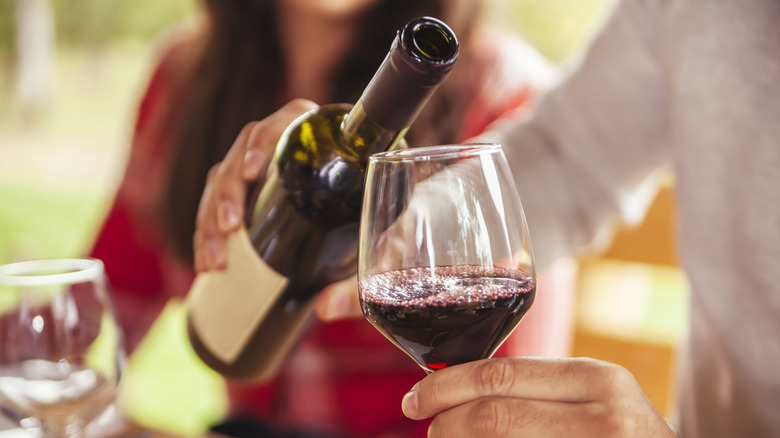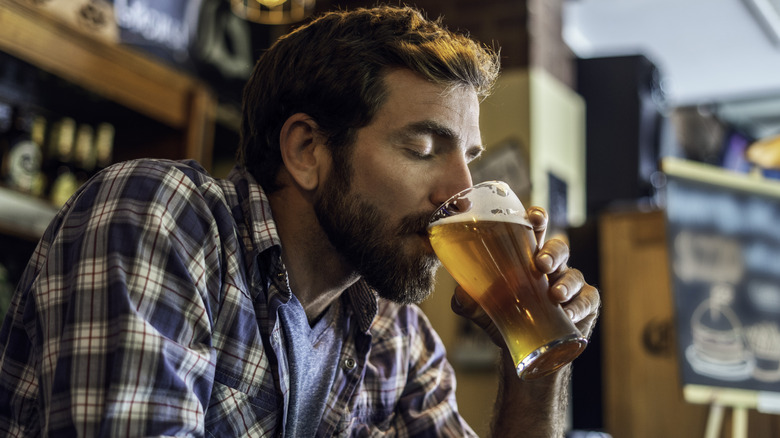Drinking Alcohol Has An Unexpected Effect On Your Blood Pressure (But Only Temporarily)
A difficult day at work can be so mentally and physically exhausting that all you want to do is come home and flop on the couch with a beer or a glass of wine. You're too lazy to cook that healthy meal from your favorite subscription service, so you order something from DoorDash while thumbing through your social media feed.
A drink or two could help you relax, and you might even notice a small drop in your blood pressure. One drink might not have a noticeable effect on blood pressure, but you could see a slightly elevated heart rate for a few hours as your body metabolizes the alcohol. According to a 2020 analysis in the Cochrane Database of Systematic Reviews, two drinks could reduce your systolic blood pressure (the top number) by 5.6 millimeters of mercury (mmHg) and diastolic (the bottom number) by 4 mmHg for about 6 hours. However, that dip in blood pressure is only temporary. Your blood pressure should return to its baseline after 6 hours.
Drinking more than two drinks could also show a dip in your blood pressure, but you'll see somewhat elevated numbers 13 hours after drinking (and experts warn against binge drinking on the weekends). If you make a habit of drinking every day, don't be surprised if your blood pressure creeps up to unhealthy levels over time.
Daily drinking is linked to higher blood pressure
A drink after work is pretty common for many people, but that drink between meals can affect your risk of hypertension. A 2004 study in Hypertension examined the link between drinking habits and high blood pressure. People who drank every day or drank on an empty stomach had a higher risk of high blood pressure compared to people who drank less frequently or drank with meals. This study didn't measure how much people drank every day.
Drinking more alcohol can increase your blood pressure by more, according to a 2023 review in Hypertension. In seven studies that included more than 20,000 people, a single drink per day raises your blood pressure slightly, but drinking four drinks a day can raise it up to three times more (read about what happens to your body when you stop drinking).
Your blood pressure tends to be highest in the morning and dips in the evening. In a 2024 study in Physiology, 44 middle-aged adults wore a 24-hour blood pressure monitor to measure their blood pressure at night. Heavy drinkers had an 8% higher systolic blood pressure and a 7% higher diastolic blood pressure in the evening. Heavy drinkers also showed less of a dip in blood pressure in the evening, which is linked to a risk of cardiovascular disease.
How alcohol affects blood pressure
Aside from giving you a buzz, alcohol affects your blood pressure through several mechanisms. Because alcohol affects your central nervous system and blood vessels, your systolic blood pressure will tend to fluctuate more based on your alcohol consumption, according to a 2014 article in the World Journal of Cardiology. You might feel relaxed after a drink or two, but alcohol actually increases the stress hormones in your body to deal with alcohol's toxins. The trigger of your sympathetic nervous system releases adrenaline, which increases your heart rate and blood pressure.
Your body naturally has built-in sensors (called baroreceptors) that help regulate your blood pressure. Alcohol reduces the sensitivity of these baroreceptors and increases your blood pressure. You also have hormones that help control your blood pressure, but alcohol raises these hormone levels. As a result, you could retain more fluid in your blood, leading to constriction in your blood vessels and higher blood pressure. Nitric oxide (NO) helps your blood vessels relax, but alcohol damages the enzymes that help produce NO. Alcohol also increases levels of a hormone that constricts your blood vessels and increases harmful free radicals that damage the lining of your blood vessels.


